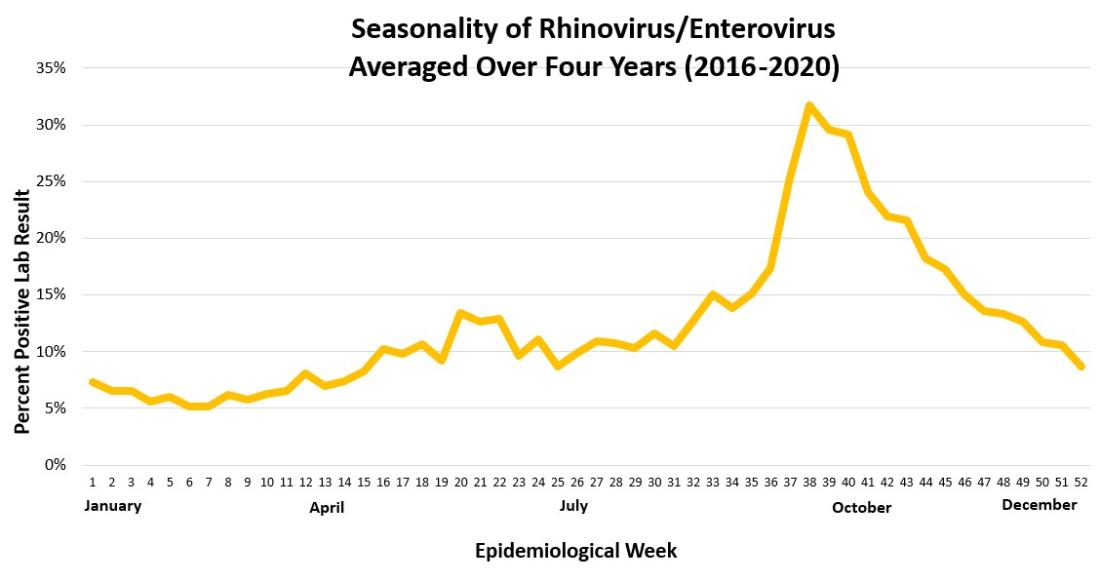Rhinovirus and Enterovirus
About 50% of common colds are caused by some kind of rhinovirus. There are more than 100 rhinoviruses and 100 enteroviruses that can infect people.
Non-polio enteroviruses and rhinoviruses are very common viruses. Most infected people have no symptoms or only mild symptoms, but some infections can be serious, especially among infants and people with weakened immune systems.
Examples of enteroviruses include Enterovirus-D68 (EV-D68); hand, foot, and mouth disease; viral meningitis; and viral conjunctivitis.
People of any age can get enterovirus and rhinovirus infections, but infants, children, and teenagers are more likely than adults to become sick. Each year in the United States, there are millions of cases of the common cold. Adults have an average of two to three colds per year, and children have even more.
To find current levels and transmission of respiratory viruses in Wisconsin, visit Respiratory Virus Data.
Respiratory viruses are primarily spread to others by respiratory droplets and aerosols that travel through the air when an infected person breathes, speaks, sings, coughs, or sneezes.
They can also be spread by contact – either with the infected person (like kissing or shaking hands), or by touching contaminated surfaces and then touching your mouth, nose, or eyes. These viruses can survive on surfaces for many hours.
Symptoms usually include:
- Sore throat
- Runny nose
- Coughing
- Sneezing
- Headaches
- Body aches
Most people recover within about seven to 10 days. However, people with weakened immune systems, asthma, or respiratory conditions may develop serious illness, such as bronchitis or pneumonia.
There is no vaccine to protect you against rhinovirus or enterovirus and no specific treatments for illnesses caused by these viruses. Most people will recover on their own. You can relieve your symptoms by:
- Taking pain or fever medications (note: never give aspirin to children)
- Using a room humidifier or taking a hot shower to help ease a sore throat and cough
- Drinking plenty of liquids to stay hydrated
- Staying home and resting
If you are concerned about your symptoms, contact your health care provider.
- Avoid close contact with sick people.
- Wash your hands for at least 20 seconds.
- Avoid touching your face (especially mouth, nose, and eyes).
- Cover your mouth and nose when coughing or sneezing.
- Disinfect objects and surfaces regularly (such as doorknobs, countertops, and light switches).
Most people get rhinovirus and enterovirus in the fall and winter, though infections can happen any time of year.
- CDC (Centers for Disease Control and Prevention): Common Cold
- CDC: Non-Polio Enterovirus
- CDC: Enterovirus D68
- CDC: Enterovirus A71
- Department of Health Services (DHS): Wash Your Hands!, P-01710: Flyer with instructions on how to properly wash hands.
- DHS: Respiratory Viruses, P-03082: An informative fact sheet explaining the similarities and differences between different respiratory viruses.
Individual cases of enterovirus are not reportable in Wisconsin.
However, clusters of three or more unrelated persons with similar clinical signs and symptoms should be reported to the local health department.
Questions about rhinovirus and enterovirus? Contact us!
Phone: 608-267-9003 | Fax: 608-261-4976


